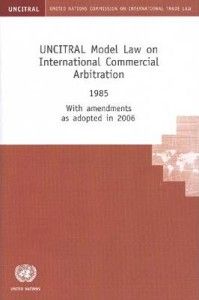The place of the ‘competence-competence’ principle in the CIS countries legislation
The internationally recognized and legally established principle of ‘competence-competence’ (kompentenz-kompetenz) authorizes an arbitral tribunal to decide itself whether it has the competence to resolve a dispute. The arbitration legislation of CIS countries firmly establishes the common requirements for applications of this principle.
At the end of 2018 and beginning 2019, arbitration legislation of several CIS countries has been amended including an indication on the competence-competence principle. Nevertheless, its realization still remains controvercial because of the way lawmakers specify and courts interpret such an ‘outlandish’ principle.
The legislators do not clearly set forth this provision in domestic legislation. Instead of a clear indication of the ‘competence-competence’ principle, lawmakers delimitate jurisdiction between state courts and arbitral tribunals regarding the validity of the arbitration agreement. The fundamental concept of this approach translates into article 3 of the Convention on the Recognition and Enforcement of Foreign Arbitral Awards (1958 Convention).
Generally, the state court, in respect of a matter on which the parties have concluded an arbitration agreement, shall at the request of a party refer the parties to arbitration, unless it finds that the said agreement is void, inoperative or incapable of being performed. In corroboration of it, an article 8 of the UNCITRAL Model Law on International Commercial Arbitration contains the same rule.
The statutory recognition of the ‘competence-competence’ principle
Both updated arbitration legislation of Kazakhstan (in the version of Law № 217-VI dated 21 January 2019) and new Uzbekistani draft law ‘On international arbitration’ (draft № 1301) do not have any amendments in connection with the competence-competence principle.
The draft law clearly establishes the idea which reflects the principle of ‘competence-competence’. According to its article 22, the arbitral tribunal may itself rule on its jurisdiction, including any objection to the existence or validity of the arbitration agreement. For this purpose, an arbitration clause that is part of a contract must be treated as an agreement independent of the other terms of the contract.
The decision of the arbitral tribunal on the invalidity of the contract does not entail the invalidity of the arbitration clause by virtue of the law. The statement about the lack of tribunal’s jurisdiction shall be raised not later than the submission of the statement of defence. The appointment by a party of an arbitrator or its participation in the appointment of an arbitrator shall not deprive the party of the right to make such a statement. The allegation that the arbitral tribunal exceeds the limits of its competence should be made as soon as the question, will be raised during the arbitral proceedings.
Kazakhstani Law on Arbitration no. 488-V in many aspects replicates the rules of the Uzbekistani draft law. In particular, it stipulates that arbitration tribunal independently resolves the question of whether or not it has the authority to consider a dispute referred to it. Also, it includes the cases where one of the parties objects to the arbitration due to the invalidity of the arbitration agreement. For this purpose, the arbitration clause of the contract constitutes an agreement, independent of the other terms of the contract. Making an arbitral award on the invalidity of the contract does not entail the invalidity of the arbitration clause.
The Law ‘On international commercial arbitration’ no. 1183 (the Law № 1183) of Tajikistan sets out identical rules but there are two features which distinguish this regulation from Kazakhstani and Uzbekistani. Article 21 of the Law no. 1183 establishes the rule that the party should submit a claim that the arbitral tribunal is not competent to consider the case no later than the submission of the statement of defence.
Coincidently, the next paragraph of this article equates non-competence of the tribunal to exceeding of tribunal’s authority. Such equalization is quite controversial able because an exceeding of authority is the execution of tribunal’s powers beyond its legal mandate and there are no concerns with regard to the legality of the tribunal itself. It is another matter when the issue relates to the admissibility of the case to the arbitral tribunal. The question that arises as to whether or not the tribunal can consider the case.
Remarkably, if the arbitral tribunal declares itself competent, any party within 15 days after receiving the notification may request the Presidium of the arbitral institution to adopt a final decision on the issue of competence. In other words, the Presidium of the arbitral institution is a supervisory instance. Clearly, the Presidium consists of others person than the members of the arbitral tribunal.
online pharmacy https://shop.fargoderm.com/wp-content/themes/twentysixteen/inc/new/diflucan.html no prescription drugstore
Thus, the fulfilment of ‘competence-competence’ principle has limits in Tajikistan law.
online pharmacy https://shop.fargoderm.com/wp-content/themes/twentysixteen/inc/new/zoloft.html no prescription drugstore
The interrelation of the principle with the procedural legislation
Despite the statutory expression of the competence-competence principle as stated above, a practical implementation of principle goes through the norms of procedural legislation. Hence, there is a very close link between domestic procedural legislation and the competence-competence principle.
In an ideal scenario, following by the principle ‘competence-competence’, in cases where one of the parties object to the arbitral proceedings because of the invalidity of the arbitration agreement an arbitration tribunal has the power to settle this matter rather than a state court.
In fact, the procedural legislation of the CIS countries and judicial practice give three general forms of interrelation between state courts, on the one hand, and arbitral institutions and tribunals, on the other. The first is an assistance of the court in granting interim measures and obtaining evidence.
online pharmacy https://shop.fargoderm.com/wp-content/themes/twentysixteen/inc/new/amoxil.html no prescription drugstore
Secondly, an interaction of courts and arbitral tribunals for the enforcement of awards of the latter. And finally the most controversial form – control over the activities of courts of arbitration.
 The last form usually comes into contradiction with the ‘competence-competence’ principle. As exemplified in Kazakhstan, the local legislation evidently recognizes that state courts have the competence to verify arbitral awards. The Civil Procedural Code of the Republic of Kazakhstan gives a certain identity of the grounds for cancellation and recognition and enforcement of arbitral awards.
The last form usually comes into contradiction with the ‘competence-competence’ principle. As exemplified in Kazakhstan, the local legislation evidently recognizes that state courts have the competence to verify arbitral awards. The Civil Procedural Code of the Republic of Kazakhstan gives a certain identity of the grounds for cancellation and recognition and enforcement of arbitral awards.
Hence, the legal rule that state court can do the revision of arbitration decisions only when solving issues of their enforcement is being interpreted incorrectly due to the confusion of enforcement and revising procedures.
However, the systematic interpretation of legislative provisions provides all grounds for the conclusion that supervision over arbitration awards is a separate activity. The state courts must follow a certain set of legislative rules as to this matter and even structurally, the chapter concerning revising of an arbitration award is placed in the chapter of Civil Code of Kazakhstan “the Revision of Judicial Acts”.
Furthermore, an arbitration agreement, being a civil law contract, is invalid if there are grounds for the lawsuit of one of the parties to the arbitration agreement. Paragraph 1 of article 20 of the Law no. 488-V provides that the question of recognizing an arbitration agreement as invalid constitutes a prerogative of the arbitration tribunal, and not of a state court.
Also, state courts commonly revise the arbitration award on the merits, citing a violation of public policy. Usually, the losing party applies for the setting aside or refusal of the arbitral award as the last argument. Practically, any violation of the application of the law or its incorrect application, in the opinion of the appealing party, may be subject to review by a state court.
Conclusion
Nobody has a right to influence on decisions of state courts. At the same time, the legal systems of the above countries permit independent existence of an alternative way for dispute resolution (independent of a State) and authorities must protect it rather than breed impediments.
The broad interpretation of grounds for revision of arbitration awards due to the non-fulfilment of competence-competence principle and high-handed discretion of state courts as to the recognition of arbitral tribunal’s powers could not be regarded as justifiable.
This approach to the competence-competence principle and to the arbitral awards could reduce the effectiveness of arbitration and the protection of participants of civil turnover, including investors. The state courts, as well as lawmakers, should abide by this principle. In either case, competence-competence constitutes an integral part of the legislation. Permissive and incorrect interpretation of it could lead to regretless consequences for all of the concerned parties.












